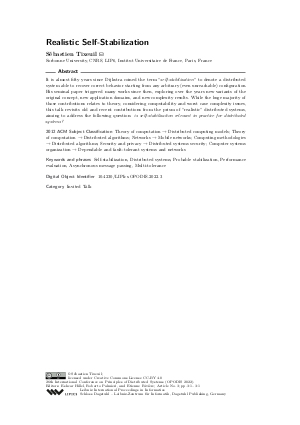Realistic Self-Stabilization (Invited Talk)
Author Sébastien Tixeuil
-
Part of:
Volume:
26th International Conference on Principles of Distributed Systems (OPODIS 2022)
Part of: Series: Leibniz International Proceedings in Informatics (LIPIcs)
Part of: Conference: International Conference on Principles of Distributed Systems (OPODIS) - License:
 Creative Commons Attribution 4.0 International license
Creative Commons Attribution 4.0 International license
- Publication Date: 2023-02-15
File

PDF
LIPIcs.OPODIS.2022.3.pdf
- Filesize: 272 kB
- 1 pages
Document Identifiers
Subject Classification
ACM Subject Classification
- Theory of computation → Distributed computing models
- Theory of computation → Distributed algorithms
- Networks → Mobile networks
- Computing methodologies → Distributed algorithms
- Security and privacy → Distributed systems security
- Computer systems organization → Dependable and fault-tolerant systems and networks
Keywords
- Self-stabilization
- Distributed systems
- Probable stabilization
- Performance evaluation
- Asynchronous message passing
- Multi-tolerance
Metrics
- Access Statistics
-
Total Accesses (updated on a weekly basis)
0Document
0Metadata
Abstract
It is almost fifty years since Dijkstra coined the term "self-stabilization" to denote a distributed system able to recover correct behavior starting from any arbitrary (even unreachable) configuration. His seminal paper triggered many works since then, exploring over the years new variants of the original concept, new application domains, and new complexity results. While the huge majority of those contributions relates to theory, considering computability and worst case complexity issues, this talk revisits old and recent contributions from the prism of "realistic" distributed systems, aiming to address the following question: is self-stabilization relevant in practice for distributed systems?
Cite As Get BibTex
Sébastien Tixeuil. Realistic Self-Stabilization (Invited Talk). In 26th International Conference on Principles of Distributed Systems (OPODIS 2022). Leibniz International Proceedings in Informatics (LIPIcs), Volume 253, p. 3:1, Schloss Dagstuhl – Leibniz-Zentrum für Informatik (2023)
https://doi.org/10.4230/LIPIcs.OPODIS.2022.3
BibTex
@InProceedings{tixeuil:LIPIcs.OPODIS.2022.3,
author = {Tixeuil, S\'{e}bastien},
title = {{Realistic Self-Stabilization}},
booktitle = {26th International Conference on Principles of Distributed Systems (OPODIS 2022)},
pages = {3:1--3:1},
series = {Leibniz International Proceedings in Informatics (LIPIcs)},
ISBN = {978-3-95977-265-5},
ISSN = {1868-8969},
year = {2023},
volume = {253},
editor = {Hillel, Eshcar and Palmieri, Roberto and Rivi\`{e}re, Etienne},
publisher = {Schloss Dagstuhl -- Leibniz-Zentrum f{\"u}r Informatik},
address = {Dagstuhl, Germany},
URL = {https://drops.dagstuhl.de/entities/document/10.4230/LIPIcs.OPODIS.2022.3},
URN = {urn:nbn:de:0030-drops-176232},
doi = {10.4230/LIPIcs.OPODIS.2022.3},
annote = {Keywords: Self-stabilization, Distributed systems, Probable stabilization, Performance evaluation, Asynchronous message passing, Multi-tolerance}
}
